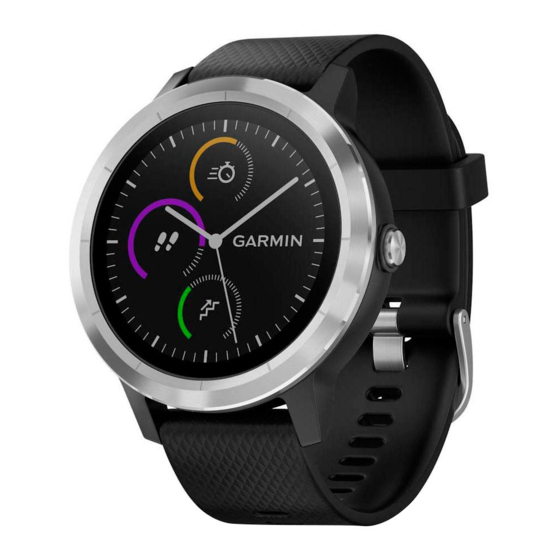Garmin VIVOACTIVE 3 Faq - Página 5
Navegue en línea o descargue pdf Faq para Ver Garmin VIVOACTIVE 3. Garmin VIVOACTIVE 3 9 páginas.
También para Garmin VIVOACTIVE 3: Manual del usuario (28 páginas), Manual de solución de problemas (7 páginas), Manual de solución de problemas (5 páginas), Manual del usuario (28 páginas)

Controlling What Android Smart
Notifications Display on a Garmin Device
Managing which notifications from an Android phone that come across to a Garmin device can
be controlled from the settings within the Garmin Connect app.
To manage Smart Notifications:
1. From the Garmin Connect app select
2. Select Settings
3. Select Smart Notifications
From here, toggle to enable or disable all Smart Notifications or customize by selecting
individual apps.
If these steps have been completed and you are not receiving any smart notifications, See Related
content below to further troubleshoot your issue.
Improving the Accuracy of the Optical Heart
Rate Sensor
The optical heart rate sensor on your Garmin watch uses light to penetrate your skin and estimate
your heart rate. This allows you to get heart rate information without the need for an additional
sensor such as a heart rate strap. To ensure best possible accuracy, follow the below guidelines.
Make sure the watch is snug tight to the point it cannot move up and down your wrist. A
little tighter when working out and a little looser when not.
Wear the watch on outside of wrist, away from wrist bone
Avoid wearing the watch over dark tattoos
Check to see if the watch has locked on to your heart rate prior to starting your activity. You can
confirm this by looking at your heart rate widget
o
Flashing heart symbol: Watch is looking for your heart rate
o
Solid heart symbol: Watch is locked onto your heart rate
Ensure green lights (LED's) are functioning
Limitations and Accuracy of Garmin's Wrist Based HR (Elevate)
The optical wrist heart rate monitor for Garmin wearables is a valuable tool that can provide an
accurate estimation of the user's heart rate at any given point in time. The optical heart rate
monitor is designed to attempt to monitor a user's heart rate 24 hours a day, 7 days a week. The
frequency at which heart rate is measured varies, and depends on the level of activity of the user.
(upper left-hand corner)
